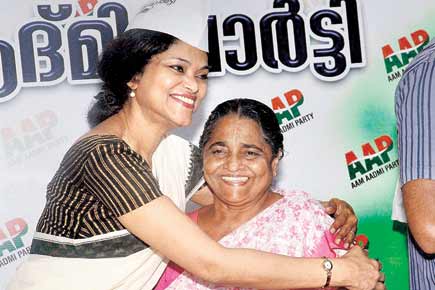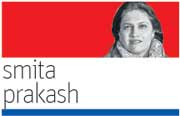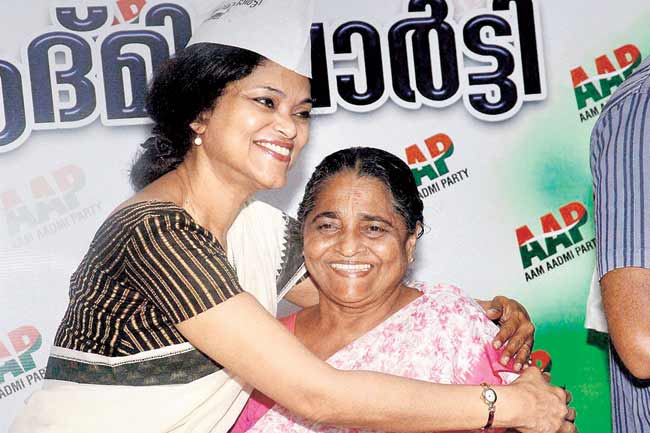A pseudonymous Twitter user, @thecomicproject, posted on Saturday: “Journalists have four designations: Journalist, Senior Journalist, Veteran Journalist, Politician.”

 A pseudonymous Twitter user, @thecomicproject, posted on Saturday: “Journalists have four designations: Journalist, Senior Journalist, Veteran Journalist, Politician.” He was referring to the recent induction of journalists into political parties, a trend which is viewed skeptically on social media. Nobody is quite comfortable with the fourth estate encroaching upon the political arena. That is because the media’s role includes being a watchdog of democratic processes and supervising the role of political players. But when these roles overlap, a shadow of doubt appears over the journalist’s past reporting: surely she must have been biased in her reporting of events.
A pseudonymous Twitter user, @thecomicproject, posted on Saturday: “Journalists have four designations: Journalist, Senior Journalist, Veteran Journalist, Politician.” He was referring to the recent induction of journalists into political parties, a trend which is viewed skeptically on social media. Nobody is quite comfortable with the fourth estate encroaching upon the political arena. That is because the media’s role includes being a watchdog of democratic processes and supervising the role of political players. But when these roles overlap, a shadow of doubt appears over the journalist’s past reporting: surely she must have been biased in her reporting of events.
ADVERTISEMENT
 Making the switch: Former CNN star reporter Anita Pratap, who is the AAP candidate from Ernakulam for the April 10th polls, has a tough fight ahead and is banking on the hundred thousand odd first-time voters in this sleepy yet cash rich city. Pic/PTI
Making the switch: Former CNN star reporter Anita Pratap, who is the AAP candidate from Ernakulam for the April 10th polls, has a tough fight ahead and is banking on the hundred thousand odd first-time voters in this sleepy yet cash rich city. Pic/PTI
Active journalists like Ashutosh, Manish Sisodia, Shazia Ilmi and Rakhi Birla are fighting elections on AAP tickets. The Trinamool Congress will field Anju Singh, a news anchor of a Hindi news channel (India News) against Sonia Gandhi in Rae Bareli, and former CNN star reporter Anita Pratap is the AAP candidate from Ernakulam for the April 10th polls.
Anita has a tough fight and is banking on the hundred thousand odd first-time voters in this sleepy yet cash rich city.
Being a journalist she ought to be able to click in this media savvy state of Kerala. There are over 20 news channels in Malayalam! There are Malayalam kid’s channels, travel channels, entertainment channels, why there is even a christian religious channel, oddly called Shalom TV! But people I met here (which included persons other than cab drivers, lest I be accused of the lazy method of information gathering) are so laid-back that it doesn’t matter if a candidate is a former journalist, a lawyer or career politician. This is a far cry from Mumbai or Delhi where I encountered antipathy when discussing the overlapping of journalism and politics.
However, journalists have jumped fences from the time of Winston Churchill and Bal Gangadhar Tilak to the present times of Ashutosh and MJ Akbar. We have had editors as advisors to Prime Ministers (HK Dua, Sanjay Baru, Ashok Tandon, Prem Shankar Jha, Sharada Prasad). The influence of powerful editors on policy making and politicians has always been significant. From being a watchdog or a hunter on a trail sniffing a story, journalists have often fallen into the trap of becoming buddies with politicians. That ought to be the time to make the switch from journalism to politics.
Riding on two boats is not ethically correct. And is hazardous.
Lending a hand at covering a rally, advising on speech delivery, helping with an odd speech here or there falls within broad acceptable limits; but leaking information about rivals, publishing planted articles, killing negative stories, not chasing leads that might land up at the door-step of a buddy-politician are the pitfalls that journalists need to watch out for. These are compromises that all of us have had to make, to some extent or the other. But when a journalist is totally committed to an ideology, a cause, and becomes an unpaid mouthpiece for a party or a politician, then it is time for her to make the switch. As some have done now, and more power to them for making that choice transparently.
Rahul Kanwal, editor Aaj Tak rightly tweeted “Journalists joining political parties isn’t a bad thing. Better to openly declare leanings than be a closet supporter of a cause.” The unidimensional journalist who can never give a balanced perspective has a short life-span in the media. They make the switch pretty soon.
British editor William Thomas Stead in an essay written in 1885 proclaimed the ‘natural and inevitable emergence of the journalist as the ultimate depository of power in modern democracy’. This powerful journalist turned politician has always been around us, name dropping, a Mr Know-it-all or a Ms Been-there-seen-it-reported it. Spot these journalists who are overfamiliar with politicians and their unbalanced reporting. They are certain to switch to politics in the days to come. They are the buddy journalists.
Once a journalist has crossed over, she is no longer in the business of seeking the truth and reporting it objectively.
And seeking the truth is a journalist’s job. It is the service she renders to society. Without meaning to sound pompous, may I say that it is almost as important as the public service politicians are supposed to render. Both obviously do not always do their jobs perfectly or to the best of their ability in a restricted environment. But the more the press freedom in a democracy, the healthier are the institutions that govern the society.
Smita Prakash is Editor, News at Asian News International. You can follow her on twitter @smitaprakash
 Subscribe today by clicking the link and stay updated with the latest news!" Click here!
Subscribe today by clicking the link and stay updated with the latest news!" Click here!






